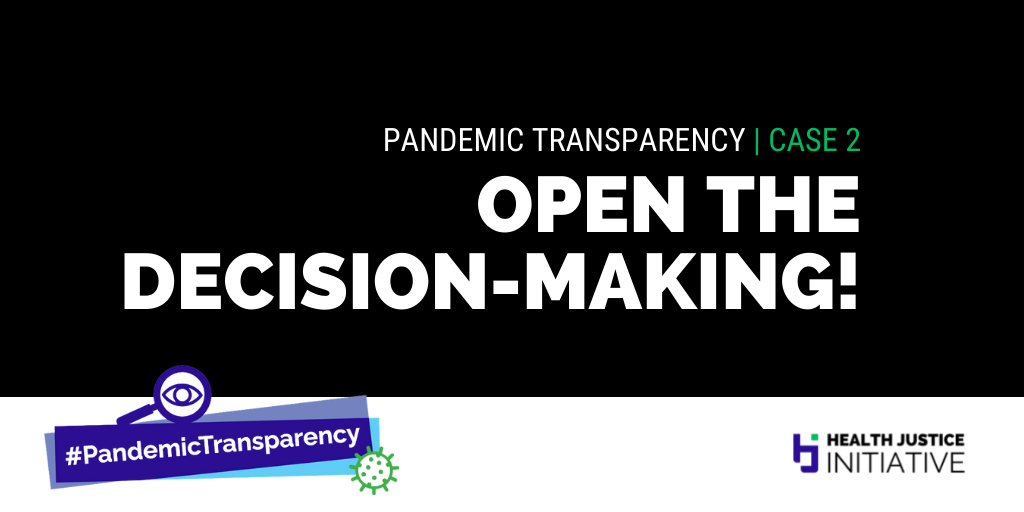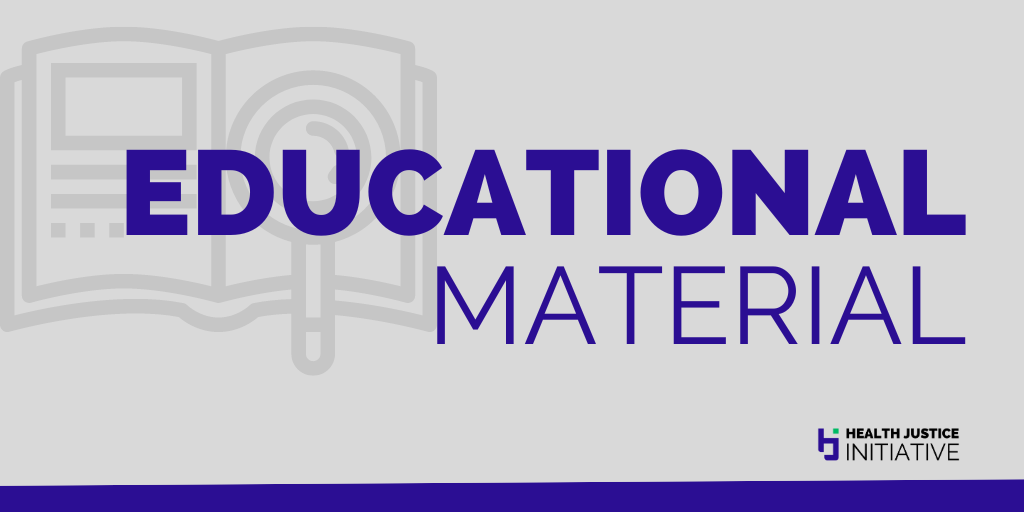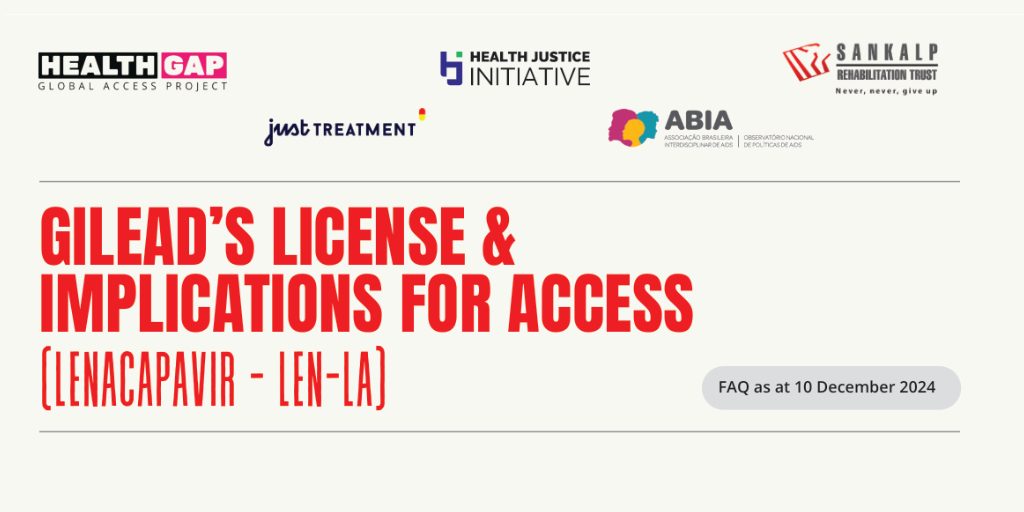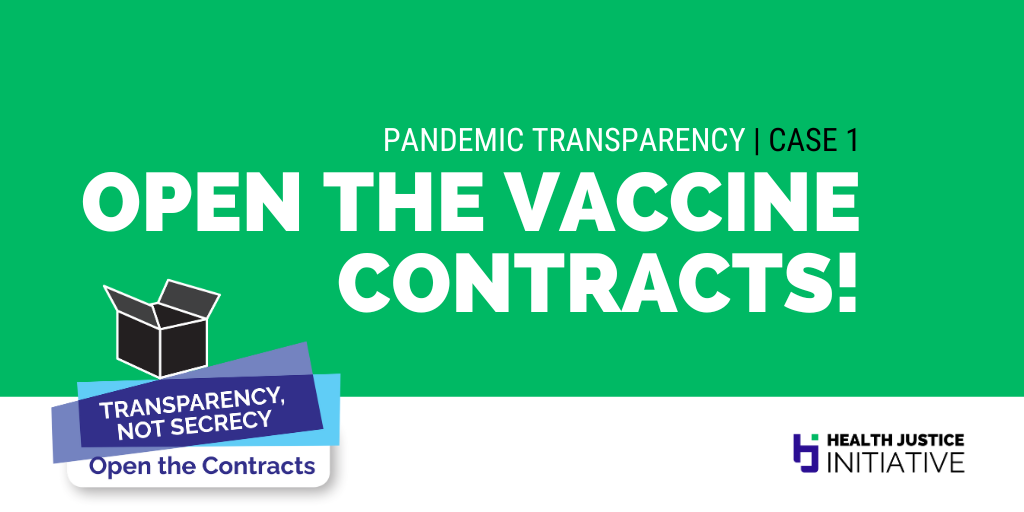Fact-sheet: Case 2 – Open Decision-Making
Case 2: Open Decision-Making
There can be no secrecy in a pandemic
Since the beginning of the pandemic, the South African government has stated that its Covid-19 response will be rooted in ‘science and evidence’.
It is important that Government was and is seeking expert input to inform its approach to the Covid-19 pandemic and to the rollout of a vaccination strategy. However, the Health Justice Initiative (HJI) believes that such expert advice should be disclosed promptly, and publicly available.
The public has a right to know the information and processes that informed key decisions on vaccine selection and use, procurement, and prioritisation in this pandemic especially at a time of vaccine scarcity.
The HJI launched two court cases that concern transparency and accountability and the public’s right to access information,”
We want to know?
- Who has been advising government, and what expert advice was given to the Minister of Health and the National Coronavirus Command Council (NCCC) since 2020 about South Africa’s Covid-19 response and the national vaccination programme – especially on issues that deal with prioritising people with comorbidities and on vaccine selection.
- How did ‘special groups’ (government officials, athletes, sports administrators) access vaccinations ahead of their age cohort when vaccine supplies were limited – who requested this and who approved this? Was there executive pressure or interference with research and regulatory bodies to deviate from established public health principles of prioritisation in a pandemic?
**Update (October 2022)
In October 2022, after the National Department of Health lodged answering affidavits on the two cases the HJI launched on Pandemic Decision-Making and provided additional information on oath, the HJI withdrew both court cases. It is regrettable that legal action had to be taken to access information and answers that should have been shared at the outset.
Read more about what we found out from the answers below:
Background to the cases:
- In 2020, the Minister of Health appointed various expert advisors to provide guidance on South Africa’s Covid-19 response – the ‘Minister’s Advisers’. While some of their expert advice has been published, not all of it is in the public domain. The names of some, but not all the Minister’s Advisors are public. The expert advice has at times been used to guide government’s decision-making.
- In 2021 the Sisonke programme was launched to vaccinate some of South Africa’s health care workers on the front line through a laudable and speedy effort. The programme was then amended several times, to also include persons other than health care workers.
- The South African Health Product Regulatory Authority (SAHPRA) later provided approvals to include the President, Deputy President and then other ‘persons of national interest’ ahead of their age cohort.
- We are trying to establish whether individuals including government officials, sports teams, athletes and sports administrators who were under 60 years of age, were vaccinated well ahead of their age cohort at a time of vaccine scarcity in the country.
1. The case involving the Minister’s Advisers and the Expert Advice they provide/d
What is this case about?
Parties: South African Minister of Health, Department of Health Information Officer and Minister of
Cooperative Governance and Traditional Affairs.
The Minister of Health and the National Coronavirus Command Council (NCCC) are guided by the ‘Minister’s Advisers’ who either serve on various Ministerial Advisory Committees (MACs) or who provide advice outside of formal MAC structures.
Some of the expert recommendations have been published by the Department of Health. Sharing all of the Minister’s Advisors names and advice is important to build trust, establish the instances in which advice was provided or not provided; and followed or not.
This case is essentially about secrecy and the need for timely access to all expert advice in a pandemic.
What is the HJI arguing in its legal papers?
- Access to information is a Constitutional right. The public has a right to know what the Ministers Advisers recommended.
- That the Minister of Health be directed, for as long as the Covid-19 pandemic remains a declared national disaster and/or a pandemic and/or is endemic to cause all expert advice and recommendations made by the
Minister’s Advisers to be published timeously.
We hope to set a precedent so that in future pandemics, this type of information is automatically
placed in the public domain in a timely manner.
Why is the publication of the Minister’s Advisers details and all related expert advice important?
- It will make clear who the experts and people who are providing expert advice to our government are, and whether our government has been following their advice.
- It will enable the public to understand the basis on which the Covid-19 pandemic is being managed, and why certain decisions were and are being taken in relation to the vaccine programme especially.
Transparency and access to information are particularly important in the context of a pandemic. If the names of all advisors, their expert advisories and recommendations are not shared, then members of the public will be in the dark as to who advised what and why.
There is no clear reason why, as a general rule, this information should be confidential. Public disclosure is essential for transparency and also acts as a safeguard against misinformation. It is vital for a sound and trust based public health response.
Why is this case at Court now?
Since mid-2021, the HJI has asked the Department of Health to share the names of all experts and to disclose copies of all the expert advice that it had received. The HJI lodged formal requests and appeals through the Promotion of Access to Information Act (PAIA). Because the HJI did not receive all of the information requested, we now have to seek legal recourse from our courts.
What is the HJI asking the Court to do?
The HJI is seeking the disclosure of all the expert advice given to government on the management of the Covid-19 pandemic within 72 hours of its submission, including the names and details of all of the Minister’s Advisers.
This includes specifically the advice given on:
- vaccine selection
- prioritisation (eligibility criteria)
- the decision to pause the use of the Covishield (AstraZeneca-University of Oxford) vaccine in South Africa
- and a copy of the contract and details of the final sale or donation of the Covishield (AstraZeneca-University of Oxford) vaccine.
**Update (October 2022)
The Department of Health belatedly filed its answering affidavit in July 2022. In it, the Department stated the following:
- The Department has published “all the VMAC and MAC advisories” (paragraphs 23 and 57) (note: it is not clear why several of the advisories from the Social and Behavioural Change MAC have not yet been published).
- The Department “exercised its discretion in terms of section 44 of PAIA to make the advice and recommendations from the MAC and VMAC publicly available” (paragraph 51).
- The Department “considered the request to make available the written advice related to vaccine selection and priority group eligibility” and the copies of all the changes. And it decided (in terms of section 44 of PAIA) that it will not make this information available (paragraph 25).
- “The Minister of Health is not constitutionally obliged to make all the expert advice and recommendations that he received from MAC and VMAC publicly available within a reasonable period” (paragraph 40) (emphasis added).
- There are indeed other expert advisors to the Minister, but that all of their names (they do not sit on any MAC) cannot be shared because: “…the list of experts is also a moving target, as and when one expert becomes unavailable, advice is sought from another expert” (paragraph 59).
- Cabinet took the decision to pause the roll-out of the Covishield (AstraZeneca-University of Oxford) vaccine programme on the basis of advice of the “MAC, VMAC and other experts” – and that expert advice is regarded as “confidential” as: “…the minutes of Cabinet are protected from disclosure in terms of PAIA” (paragraph 30).
As a civil society organisation that advocates for greater transparency, the HJI disagrees in many respects with this particular approach because we believe that the details of all the Ministers’ advisors and the expert advice that informs government decision-making in this pandemic should always be promptly shared, as it is in the public interest. The decision to share should also be less dependent on Ministerial “discretion”.
2. The case involving the Sisonke programme and the decision to authorise early vaccination for special groups (sports teams, sports administrators and government officials)
Parties: Minister of Health, Information Officer National Department of Health, Minister of Cooperative Governance and Traditional Affairs, South African Medical Research Council and the Minister of Sports, Arts and Culture.
What is the case about?
The Sisonke programme is a special research study that consists/ed of a collaboration between the National Department of Health, the South African Medical Research Council (SAMRC) and the Janssen Pharmaceutical Group (the manufacturing group of the ‘Johnson & Johnson vaccine’).
To vaccinate South Africa’s health care workers, urgently and speedily, in early 2021, when South Africa was facing a severe wave of Covid-19 cases, with insufficient access to vaccine supplies, coupled with a government decision to pause the use of the Covishield (AstraZeneca-University of Oxford) vaccine for health care workers, the Sisonke programme was quickly registered as a special ‘trial’ [an open-label, single arm Phase 3B implementation study] to vaccinate health care workers.
500 000 doses of vaccines were originally made available as a donation from the Janssen Pharmaceutical Group. Between 17 February 2021 to 15 May 2021 – 479 768 health workers received one dose of a Johnson & Johnson vaccine under the Sisonke programme under Phase 1 of South Africa’s national vaccine programme.
By May 2021, when Phase 2 of South Africa’s national vaccine programme commenced, prioritising people over 60 years, several media outlets and others reported that rugby, cricket, soccer, and the SA Olympic teams, including athletes and various sporting officials (and government officials) received or were to receive a vaccine through the Sisonke programme ahead of their age cohort (under 60 years of age).
- This was at a time of vaccine supply shortages and when only people aged 60 years and older or health care workers were eligible for vaccines in the national roll-out programme as part of ‘Phase 1’ and ‘Phase 2’.
- All other persons in South Africa, including those with comorbidities, under 60 years of age, were required to
‘wait their turn’ (age cohort).
This case is essentially about transparency and the decision-making process that allows/ed so called ‘special groups’ to jump the vaccine queue in a pandemic, when vaccine supplies were not readily available to everyone at the same time.
In a time of vaccine supply scarcity – who should be prioritised and how should that happen?
Why is this going to Court now?
In 2021 the HJI wrote to the relevant departments, regulatory and research bodies and by mid-2021, the HJI submitted several access to information requests to obtain information related to who exactly benefited from the Sisonke programme and its stock, why, and the related approval processes and/or ethics and regulatory clearances.
Elite athletes and ’persons of national interest’.
In July 2021 the Director-General of Health stated that:
We would like to confirm that the National Department of Health was approached by the Department of Sports, Arts & Culture with a request to support the vaccination of athletes that would be attending the Tokyo Olympics Games that commenced in Japan on 23 July 2021. We also understood that the MRC would be obtaining SAHPRA’s approval to expand the Sisonke Phase 3B Open Label Study to include the Athletes in relation to the left-over Johnson &Johnson vaccines. The NDOH was supportive of this as it would ensure the health and safety of the South African delegation attending the Tokyo Olympics.
In September 2021 the HJI lodged internal appeals under the Promotion of Access to Information Act (PAIA).
- The South African Health Products Regulatory Authority (SAHPRA – the medicines regulator) responded, and shared documentation (some redacted) by early 2022.
- This included the narrow and limited approval it provided for deviations in respect of the Sisonke programme for ’persons of national interest’.
- SAHPRA provided information to the HJI that showed that:
- SAHPRA deliberated on multiple deviation or waiver requests for the Sisonke trial.
- In correspondence shared with the HJI, SAHPRA disclosed the redacted minutes of the Clinical Trials Committee (CTC) deliberations.
- One committee member noted:
we have made endless waivers to SISONKE which though initially legitimate creates precedence and might jeopardise our working as CTC if not properly managed now….
- One committee member noted:
- SAHPRA approved and granted a ‘waiver’ to use ‘left-over investigational product’ from the Sisonke 1 trial for ‘persons of national interest’:
- ‘Athletes
- Coaches
- Physiotherapists
- Doctors
- Other specific technical/essential members of the support team that accompany the athletes’.
Why is the decision-making on vaccinating people AHEAD of their age cohort important?
Government departments and all research and regulatory bodies should have open decision-making processes in a pandemic.
If everyone else under 40 or 35 or 30 years of age in South Africa had to wait for months to be eligible, why should so called ‘special groups’ not do the same and who decides what a ‘special group’ is?
- In a pandemic, the public has a right to know if there was any executive interference or special vested interests at play in prioritising the vaccination of certain groups of people (here athletes, sports officials, and government officials) well ahead of their age cohort.
- In the next pandemic and the next single national vaccine roll out programme, we cannot have a situation where people with comorbidities, the elderly and other vulnerable groups, have to wait for their turn WHILE young and healthy athletes (even those not in the Olympics team) and other officials are given preferential access to limited supplies of vaccines. The ethical framework to manage this must be transparent too, and robust.
- In a pandemic, with vaccine scarcity, business, travel and/or sporting interests cannot take precedence over globally accept public health risk and prioritisation principles.
What is the HJI asking for?
In line with the public’s right to access to information, the HJI is seeking amongst other things, copies of:
- Requests or motivations from the national departments of Health and of Sports, Arts and Culture to the SAMRC, SAHPRA, National Coronavirus Command Council, the Ministerial Advisory Committees and relevant sports bodies for permission to authorise people other than health care workers under the Sisonke programme, to be vaccinated, well ahead of their age cohort.
- Responses to above including approvals, waivers or rejections.
- The list of all categories of persons offered and/or administered a vaccine under the auspices of the Sisonke programme and from any of its stock for April – June 2021.
**Update (October 2022)
In May 2022, the SAMRC responded to the HJI in a letter (they never submitted an answering affidavit).
The SAMRC stated that “1000 vaccines” were made available for “sports people and accompanying staff”
that included “Olympians: 428; Para-Olympians: 88”; and, for “Rugby: 286; Cricket:105 and Soccer: 93”. There were also “320 vaccines” allocated to the Department of International Relations and Cooperation (DIRCO).
In July 2022, the Departments of Health and Sports, Arts and Culture filed its Answering Affidavit.
They stated that they supported the early vaccination of the Olympic squad at the request of the South
African Sports Confederation and Olympic Committee (SASCOC), which SAHPRA subsequently approved.
They also stated that they “have no knowledge of nor the circumstances related to the request” to
vaccinate other sports teams / officials and / or government officials.
SAHPRA in its earlier correspondence with the HJI stated that “is not aware, nor did it authorise any
additional categories of persons to be vaccinated under the Sisonke Programme”.
Through this case the HJI has been able to access new information about the allocation of vaccines
under the Sisonke programme to certain individuals ahead of their age cohort, that was previously not
publicly shared. In reviewing all the responses, to the case, the HJI has now written to SAHPRA to verify
that all the allocations under the Sisonke programme took place in compliance with the Medicines Act,
relevant guidelines and ethics requirements.
Based on the length of time it took to obtain answers and information and the nature of the content
shared, the HJI strongly believes that there is a need for pandemic worthy Guidelines that focus on,
among others, transparency, and equitable allocation in a pandemic.
In October 2022, the HJI has thus asked SAHPRA to consider strengthening applicable clinical trial
frameworks or best practices going forward – including developing or amending Guidelines for the future, drawing on the lessons of the Covid-19 pandemic and from the circumstances of the Sisonke study / programme that focus on:
- Including equity as a key factor in allocation frameworks in any trial, study (similar), or for any
(clinically approved and recommended) left-over investigational product during times of global and local scarcity, and for any future pandemics, including requiring approval from an ethics committee for the re-direction of any such products. - Consideration of how best to avoid the potential of undue influence by well-resourced sporting codes and / or government departments and / or other bodies and individuals.
- Ensuring that there is a robust and pandemic worthy ‘Research/er Code of Ethical Conduct’ located within the current ‘South African Good Clinical Practice: Clinical Trial Guidelines (2020)’.
- Mandate the proactive and public disclosure in real time of trial / study applications, review status,
approvals, requests for waivers or amendments including for eligibility and even for left over
investigational product.
You can access the HJI’s referral Letter to SAHPRA and annexures here (October 2022)
This includes SAMRC’s responses to the HJI about this matter.
Can I access the HJI’s court papers?
Yes. Visit healthjusticeinitiative.org.za/pandemic-transparency/




